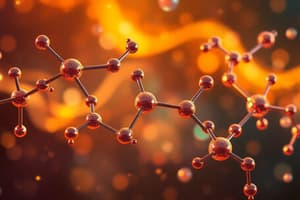Podcast
Questions and Answers
Which hormone is responsible for the growth and development of ovarian follicles and ovarian secretion of estrogen in females, and for sperm production in males?
Which hormone is responsible for the growth and development of ovarian follicles and ovarian secretion of estrogen in females, and for sperm production in males?
- FSH (correct)
- LH
- ACTH
- TSH
What hormone is produced by the anterior pituitary to control the growth of the adrenal cortex and stimulate the secretion of cortisol?
What hormone is produced by the anterior pituitary to control the growth of the adrenal cortex and stimulate the secretion of cortisol?
- FSH
- TSH
- LH
- ACTH (correct)
Which hormone is responsible for enhancing breast development and milk production in females?
Which hormone is responsible for enhancing breast development and milk production in females?
- ADH
- LH
- Prolactin (PRL) (correct)
- TSH
The hormone that regulates urinary water loss and promotes renal water reabsorption is:
The hormone that regulates urinary water loss and promotes renal water reabsorption is:
Which gland secretes melatonin, known as 'the hormone of darkness'?
Which gland secretes melatonin, known as 'the hormone of darkness'?
Where are thyroid hormones synthesized and stored until release?
Where are thyroid hormones synthesized and stored until release?
Which layer or zone of the adrenal cortex secretes mineralocorticoids?
Which layer or zone of the adrenal cortex secretes mineralocorticoids?
What is the function of the inner adrenal medulla?
What is the function of the inner adrenal medulla?
Which hormone stimulates uterine contractions during childbirth and milk ejection during breastfeeding?
Which hormone stimulates uterine contractions during childbirth and milk ejection during breastfeeding?
What hormone promotes thyroid gland development and stimulates the secretion of thyroid hormones?
What hormone promotes thyroid gland development and stimulates the secretion of thyroid hormones?
What controls the secretion of prolactin (PRL) from the pituitary gland?
What controls the secretion of prolactin (PRL) from the pituitary gland?
Which hormone is responsible for regulating sodium and potassium balance, blood pressure homeostasis, and long-term metabolic control?
Which hormone is responsible for regulating sodium and potassium balance, blood pressure homeostasis, and long-term metabolic control?
Which hormone is essential for maintaining Na+ & K+ balance and ECF volume?
Which hormone is essential for maintaining Na+ & K+ balance and ECF volume?
What hormone is involved in the regulation of carbohydrate, protein, and fat metabolism?
What hormone is involved in the regulation of carbohydrate, protein, and fat metabolism?
Which hormone is primarily secreted in response to a direct effect of a fall in blood glucose concentration?
Which hormone is primarily secreted in response to a direct effect of a fall in blood glucose concentration?
Which hormone exerts opposite effects to parathyroid hormone (PTH) by lowering plasma Ca++ levels via bone resorption and renal reabsorption?
Which hormone exerts opposite effects to parathyroid hormone (PTH) by lowering plasma Ca++ levels via bone resorption and renal reabsorption?
What is the primary function of the testes?
What is the primary function of the testes?
Which hormone is secreted by Leydig cells of the testes and increases rapidly at puberty?
Which hormone is secreted by Leydig cells of the testes and increases rapidly at puberty?
What is the key function of oestrogens?
What is the key function of oestrogens?
Which hormone helps mediate sexual response in the brain and inhibits uterine contractions during gestation?
Which hormone helps mediate sexual response in the brain and inhibits uterine contractions during gestation?
What is the main function of adrenaline and noradrenaline secreted by the adrenal medulla?
What is the main function of adrenaline and noradrenaline secreted by the adrenal medulla?
What hormone promotes cellular uptake and storage of glucose, fatty acids, and amino acids, and plays a key role in adaptation to stress?
What hormone promotes cellular uptake and storage of glucose, fatty acids, and amino acids, and plays a key role in adaptation to stress?
What hormone regulates fuel metabolism and plays a key role in adaptation to stress?
What hormone regulates fuel metabolism and plays a key role in adaptation to stress?
Which hormone is involved in the regulation of carbohydrate, protein, and fat metabolism?
Which hormone is involved in the regulation of carbohydrate, protein, and fat metabolism?
Which of the following is NOT a function of the Endocrine System?
Which of the following is NOT a function of the Endocrine System?
How are hormones transported in the bloodstream?
How are hormones transported in the bloodstream?
Which type of hormone synthesis occurs through a vesicle-mediated pathway?
Which type of hormone synthesis occurs through a vesicle-mediated pathway?
How is the timing and pattern of hormonal secretion regulated?
How is the timing and pattern of hormonal secretion regulated?
Which division of the Endocrine System is referred to as 'master regulators'?
Which division of the Endocrine System is referred to as 'master regulators'?
What connects the Hypothalamus and Pituitary Gland?
What connects the Hypothalamus and Pituitary Gland?
Which part of the Pituitary Gland is responsible for secreting hormones that control the function of many target glands and cells?
Which part of the Pituitary Gland is responsible for secreting hormones that control the function of many target glands and cells?
Which hormone is responsible for regulating overall body growth, soft tissue growth, bone growth, and protein synthesis?
Which hormone is responsible for regulating overall body growth, soft tissue growth, bone growth, and protein synthesis?
What modulates growth hormone secretion in the body?
What modulates growth hormone secretion in the body?
What type of disorders may result from abnormalities in hormonal secretion or target cell responsiveness?
What type of disorders may result from abnormalities in hormonal secretion or target cell responsiveness?
Which hormone is responsible for regulating urinary water loss and promoting renal water reabsorption?
Which hormone is responsible for regulating urinary water loss and promoting renal water reabsorption?
What hormone promotes thyroid gland development and stimulates the secretion of thyroid hormones?
What hormone promotes thyroid gland development and stimulates the secretion of thyroid hormones?
Which hormone is responsible for the growth and development of ovarian follicles and ovarian secretion of estrogen in females, and for sperm production in males?
Which hormone is responsible for the growth and development of ovarian follicles and ovarian secretion of estrogen in females, and for sperm production in males?
What hormone is primarily secreted in response to a direct effect of a fall in blood glucose concentration?
What hormone is primarily secreted in response to a direct effect of a fall in blood glucose concentration?
Which hormone is involved in the regulation of carbohydrate, protein, and fat metabolism?
Which hormone is involved in the regulation of carbohydrate, protein, and fat metabolism?
What hormone promotes cellular uptake and storage of glucose, fatty acids, and amino acids, and plays a key role in adaptation to stress?
What hormone promotes cellular uptake and storage of glucose, fatty acids, and amino acids, and plays a key role in adaptation to stress?
Which hormone is essential for maintaining Na+ & K+ balance and ECF volume?
Which hormone is essential for maintaining Na+ & K+ balance and ECF volume?
Which hormone is primarily responsible for maintaining Na+ & K+ balance and ECF volume?
Which hormone is primarily responsible for maintaining Na+ & K+ balance and ECF volume?
What hormone is primarily secreted in response to a direct effect of a fall in blood glucose concentration?
What hormone is primarily secreted in response to a direct effect of a fall in blood glucose concentration?
Which hormone plays a key role in adaptation to stress and regulates fuel metabolism?
Which hormone plays a key role in adaptation to stress and regulates fuel metabolism?
What hormone promotes the development of the male reproductive organs, secondary sexual characteristics, and maintains sexual desire and drive?
What hormone promotes the development of the male reproductive organs, secondary sexual characteristics, and maintains sexual desire and drive?
Which hormone is involved in the regulation of carbohydrate, protein, and fat metabolism, enhancing protein synthesis and catabolism?
Which hormone is involved in the regulation of carbohydrate, protein, and fat metabolism, enhancing protein synthesis and catabolism?
Which hormone is the single most important regulator of blood Ca++ levels, raising plasma Ca++ levels via bone resorption, renal reabsorption, and intestinal absorption?
Which hormone is the single most important regulator of blood Ca++ levels, raising plasma Ca++ levels via bone resorption, renal reabsorption, and intestinal absorption?
What hormone is responsible for reinforcing the 'fight-or-flight' response and maintaining arterial blood pressure?
What hormone is responsible for reinforcing the 'fight-or-flight' response and maintaining arterial blood pressure?
Which hormone is responsible for promoting maturation and maintenance of the reproductive organs, secondary sexual characteristics, and has critical roles in the normal female reproductive cycle?
Which hormone is responsible for promoting maturation and maintenance of the reproductive organs, secondary sexual characteristics, and has critical roles in the normal female reproductive cycle?
What hormone is secreted by granulosa cells of the ovarian follicle and increases rapidly at puberty?
What hormone is secreted by granulosa cells of the ovarian follicle and increases rapidly at puberty?
What hormone is involved in supplementing sex hormones, promoting protein anabolism and growth, and is physiologically significant in females?
What hormone is involved in supplementing sex hormones, promoting protein anabolism and growth, and is physiologically significant in females?
Which hormone exerts opposite effects to parathyroid hormone (PTH), lowering plasma Ca++ levels via bone resorption and renal reabsorption?
Which hormone exerts opposite effects to parathyroid hormone (PTH), lowering plasma Ca++ levels via bone resorption and renal reabsorption?
What hormone is secreted by Leydig cells of the testes and increases rapidly at puberty?
What hormone is secreted by Leydig cells of the testes and increases rapidly at puberty?
Which type of hormone synthesis occurs through a vesicle-mediated pathway?
Which type of hormone synthesis occurs through a vesicle-mediated pathway?
What modulates growth hormone secretion in the body?
What modulates growth hormone secretion in the body?
Which hormone is responsible for enhancing breast development and milk production in females?
Which hormone is responsible for enhancing breast development and milk production in females?
Which part of the Pituitary Gland is responsible for secreting hormones that control the function of many target glands and cells?
Which part of the Pituitary Gland is responsible for secreting hormones that control the function of many target glands and cells?
What connects the Hypothalamus and Pituitary Gland?
What connects the Hypothalamus and Pituitary Gland?
What is the main function of adrenaline and noradrenaline secreted by the adrenal medulla?
What is the main function of adrenaline and noradrenaline secreted by the adrenal medulla?
Where are thyroid hormones synthesized and stored until release?
Where are thyroid hormones synthesized and stored until release?
Which part of the Endocrine System is referred to as 'master regulators'?
Which part of the Endocrine System is referred to as 'master regulators'?
How are hormones transported in the bloodstream?
How are hormones transported in the bloodstream?
What hormone promotes cellular uptake and storage of glucose, fatty acids, and amino acids, and plays a key role in adaptation to stress?
What hormone promotes cellular uptake and storage of glucose, fatty acids, and amino acids, and plays a key role in adaptation to stress?
What hormone regulates fuel metabolism and plays a key role in adaptation to stress?
What hormone regulates fuel metabolism and plays a key role in adaptation to stress?
What part of the Endocrine System includes the thyroid glands, adrenal glands, endocrine pancreas, parathyroid glands, and gonads?
What part of the Endocrine System includes the thyroid glands, adrenal glands, endocrine pancreas, parathyroid glands, and gonads?
Study Notes
-
The Endocrine System is a specialized ductless system that regulates, integrates, coordinates, and controls important cellular, organ, and body functions.
-
It consists of specialized glands and neurosecretory cells scattered throughout the body that secrete biologically active chemical messengers (hormones) into the bloodstream.
-
Hormones are carried in the bloodstream to interact with distant target cells, leading to specific responses in terms of metabolism, growth, or reproduction.
-
The functions of the Endocrine System include regulation of cellular metabolism and water & electrolyte balance, control of growth, development, and reproduction, and adaptation to stressful situations.
-
Hormones can be classified chemically as amines & amino acid derivatives, polypeptides, proteins & glycoproteins, steroids, and hydrophilic vs lipophilic.
-
Hormone synthesis occurs through either a vesicle-mediated pathway or a non-vesicle-mediated pathway, and transport can be free and unbound or carrier protein-bound.
-
The timing and pattern of hormonal secretion are regulated through negative-feedback control, end-product inhibition, and diurnal or circadian rhythms.
-
Hormonal signalling occurs through interaction with specific receptors, which can be linked to effector systems within the cell.
-
The Endocrine System includes two broad anatomical divisions: the Central Endocrine Glands (hypothalamus, pituitary gland, pineal gland) and the Peripheral Endocrine Glands (thyroid glands, adrenal glands, endocrine pancreas, parathyroid glands, gonads).
-
The Central Endocrine Glands function cooperatively as 'master regulators' of the endocrine system, controlling critical homeostatic and metabolic functions.
-
The Hypothalamus and Pituitary Gland are connected by the hypophyseal portal system and the hypothalamo-hypophyseal nerve tract.
-
The Hypothalamus acts as a neuroendocrine transducer, releasing hormones to control pituitary hormone secretions.
-
The Pituitary Gland, often referred to as the 'master gland,' secretes hormones that control the function of many target glands and cells, consisting of the Anterior Pituitary (adenohypophysis) and Posterior Pituitary (neurohypophysis).
-
The Anterior Pituitary secretes and releases six major hormones, while the Posterithyroid gland stores and releases two hormones.
-
Growth hormone (GH) is the primary hormone for regulation of overall body growth, stimulating growth of soft tissues, bone, and cartilage, and promoting cell division and protein synthesis.
-
Growth hormone also plays an important role in intermediary metabolism, exerting largely anti-insulin effects and increasing lipolysis, mobilizing and using free fatty acids as fuel, and inhibiting peripheral cellular glucose uptake to maintain blood glucose levels.
-
Growth hormone secretion is modulated by releasing hormones from the hypothalamus (GHRH, somatostatin, dopamine) and the gastric fundus (ghrelin).
-
Hormonal disorders may result from hyposecretion or hypersecretion of hormones or abnormal target cell responsiveness.
-
The Endocrine System is a specialized ductless system that regulates, integrates, coordinates, and controls important cellular, organ, and body functions.
-
It consists of specialized glands and neurosecretory cells scattered throughout the body that secrete biologically active chemical messengers (hormones) into the bloodstream.
-
Hormones are carried in the bloodstream to interact with distant target cells, leading to specific responses in terms of metabolism, growth, or reproduction.
-
The functions of the Endocrine System include regulation of cellular metabolism and water & electrolyte balance, control of growth, development, and reproduction, and adaptation to stressful situations.
-
Hormones can be classified chemically as amines & amino acid derivatives, polypeptides, proteins & glycoproteins, steroids, and hydrophilic vs lipophilic.
-
Hormone synthesis occurs through either a vesicle-mediated pathway or a non-vesicle-mediated pathway, and transport can be free and unbound or carrier protein-bound.
-
The timing and pattern of hormonal secretion are regulated through negative-feedback control, end-product inhibition, and diurnal or circadian rhythms.
-
Hormonal signalling occurs through interaction with specific receptors, which can be linked to effector systems within the cell.
-
The Endocrine System includes two broad anatomical divisions: the Central Endocrine Glands (hypothalamus, pituitary gland, pineal gland) and the Peripheral Endocrine Glands (thyroid glands, adrenal glands, endocrine pancreas, parathyroid glands, gonads).
-
The Central Endocrine Glands function cooperatively as 'master regulators' of the endocrine system, controlling critical homeostatic and metabolic functions.
-
The Hypothalamus and Pituitary Gland are connected by the hypophyseal portal system and the hypothalamo-hypophyseal nerve tract.
-
The Hypothalamus acts as a neuroendocrine transducer, releasing hormones to control pituitary hormone secretions.
-
The Pituitary Gland, often referred to as the 'master gland,' secretes hormones that control the function of many target glands and cells, consisting of the Anterior Pituitary (adenohypophysis) and Posterior Pituitary (neurohypophysis).
-
The Anterior Pituitary secretes and releases six major hormones, while the Posterithyroid gland stores and releases two hormones.
-
Growth hormone (GH) is the primary hormone for regulation of overall body growth, stimulating growth of soft tissues, bone, and cartilage, and promoting cell division and protein synthesis.
-
Growth hormone also plays an important role in intermediary metabolism, exerting largely anti-insulin effects and increasing lipolysis, mobilizing and using free fatty acids as fuel, and inhibiting peripheral cellular glucose uptake to maintain blood glucose levels.
-
Growth hormone secretion is modulated by releasing hormones from the hypothalamus (GHRH, somatostatin, dopamine) and the gastric fundus (ghrelin).
-
Hormonal disorders may result from hyposecretion or hypersecretion of hormones or abnormal target cell responsiveness.
Studying That Suits You
Use AI to generate personalized quizzes and flashcards to suit your learning preferences.
Related Documents
Description
This quiz covers the lecture outline for Week 15 of the MPharm Programme, focusing on the normal systems and the endocrine system. Topics include general principles of endocrine function, types of hormones and signaling pathways, central and peripheral endocrine glands, and their respective hormones.





